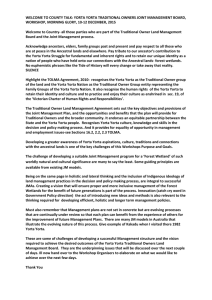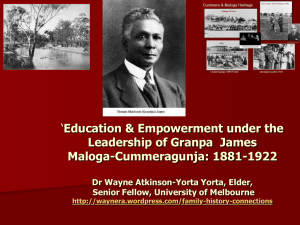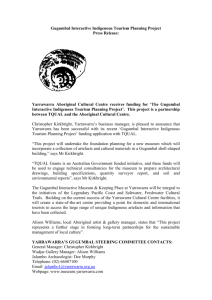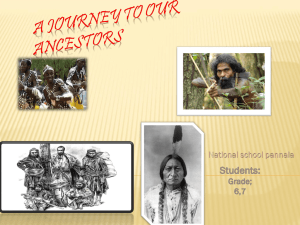National Workshop on Indigenous Knowledge for Climate Change Adaptation
advertisement
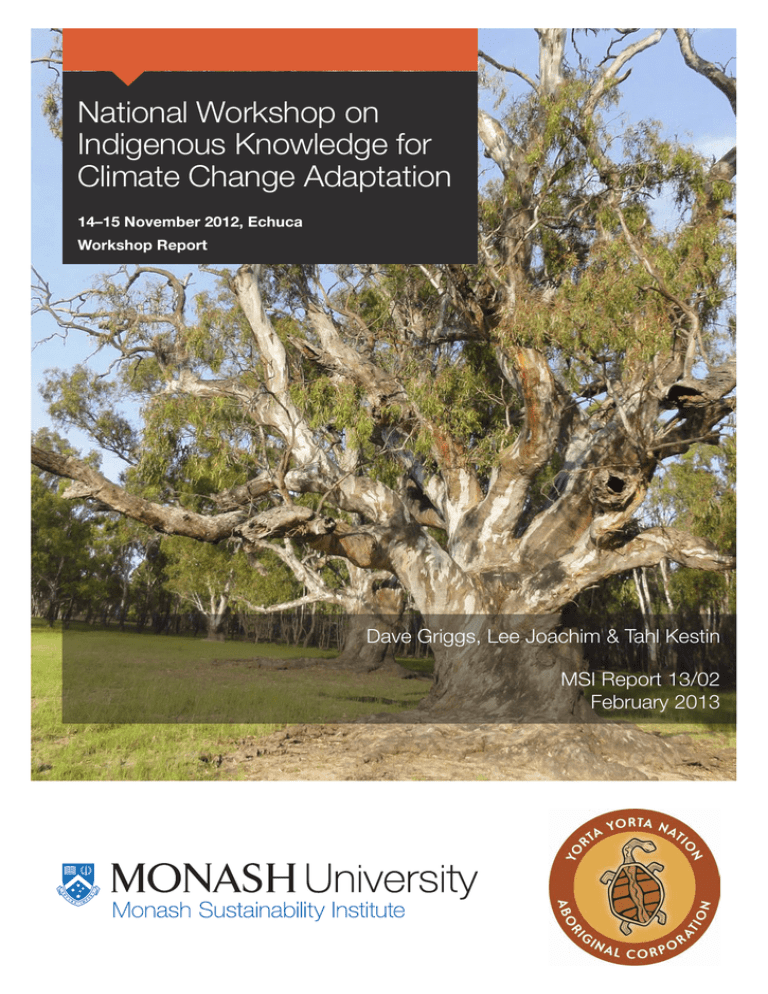
National Workshop on Indigenous Knowledge for Climate Change Adaptation 14–15 November 2012, Echuca Workshop Report Dave Griggs, Lee Joachim & Tahl Kestin MSI Report 13/02 February 2013 Published by the Monash Sustainability Institute MSI Report 13/02, February 2013 ISBN: 978-0-9870821-5-2 Authors Dave Griggs1, Lee Joachim2 & Tahl Kestin1 1 2 Monash Sustainability Institute, Monash University Yorta Yorta Nation Aboriginal Corporation Contact Monash Sustainability Institute Building 74, Clayton Campus Monash University, Victoria 3800, Australia T: +61 3 9905 9323 E: enquiries@msi.monash.edu W: www.monash.edu/research/sustainability-institute/ Acknowledgement This work was carried out with financial support from the Australian Government (Department of Climate Change and Energy Efficiency) and the National Climate Change Adaptation Research Facility (NCCARF). The views expressed herein are not necessarily the views of the Commonwealth or NCCARF, and neither the Commonwealth nor NCCARF accept responsibility for information or advice contained herein. The role of NCCARF is to lead the research community in a national interdisciplinary effort to generate the information needed by decision-makers in government, business and in vulnerable sectors and communities to manage the risk of climate change impacts. Disclaimer Monash University disclaims all liability for any error, loss or consequence which may arise from relying on any information in this publication. Table of Contents Executive Summary ........................................................................................................................................... 2 Introduction ........................................................................................................................................................ 3 Workshop Conclusions and Recommendations ................................................................................................ 5 Appendix 1: Workshop Participants ................................................................................................................... 9 Appendix 2: Workshop Program ...................................................................................................................... 11 Appendix 3: Panel discussion flyer .................................................................................................................. 14 Indigenous knowledge for climate change adaptation – Workshop summary |1 Executive Summary The National Workshop on Indigenous Knowledge for Climate Change Adaptation took place on Yorta Yorta land on 14–15 November 2012 with over 90 participants from across Australia and overseas. The workshop was co-hosted by the Yorta Yorta Nation Aboriginal Corporation (YYNAC) and the Monash Sustainability Institute as part of a National Climate Change Adaptation Research Facility (NCCARF) project. The workshop set out to examine how Indigenous knowledge can contribute to improved climate change adaptation for the First Nations of Australia, and the Australian community in general. However, while participants acknowledged that Indigenous knowledge can have an important role in climate change adaptation, they were clear that a much more central and urgent priority was the need to empower First Nation communities to make their own assessments and decisions on the best ways for them to respond to climate change. Climate change is a serious issue for the First Nations of Australia as a range of factors make them more vulnerable to the projected impacts of climate change than the general Australian population both tangibly and spiritually. Supporting First Nations communities to respond to climate change should therefore be a high priority area for adaptation-related research and policy. Programs aimed at adaptation for First Nations communities must focus on empowering communities to identify and implement their own responses to climate change, as only they are in a position to determine the best solutions for their unique needs, interests, and circumstances. The main areas where support should be provided are to: • Access good information and research and develop the necessary skills with their communities to understand what climate change means for them and determine the best adaptation options. This could be done through the development of a web portal for climate change information relevant to First Nations communities, connection of communities with scientists who can help them understand climate change and explore its implications, and a higher priority and funding for research with First Nations communities on the impacts of climate change. • Implement their choice of adaptation options within their communities and establish meaningful access to regional and national policy and decision-making processes affecting their lands. Many communities have limited say about what programs are implemented in their communities and limited influence over policy processes affecting their traditional lands. This situation can only be remedied by reforming policy processes away from top-down prescriptive approaches and by ensuring meaningful consultation processes. • Develop opportunities for knowledge sharing between First Nations communities in Australia and Indigenous people overseas, for example through further workshops. Meaningful engagement by government, academia and others is the basis of effective collaboration, consultation, and dialogue with the First Nations of Australia. It must be founded on trust, respect, and the recognition that the concerns, standpoints, needs and knowledge of all involved are legitimate. First Nations communities need to assert their rights and needs in regards to climate change adaptation and be proactive about taking action. Communities can do this by initiating and undertaking research projects and community-development programs that address community needs. Appropriate outcomes from projects can be assured by being informed and empowered participants, educating people outside the community about appropriate ways to engage with projects, and developing connections with other communities to support knowledge sharing around climate change and the development of a unified voice. The process of capturing Indigenous knowledge, and its presentation through cultural mapping, can be a useful tool for climate change adaptation, and has many other benefits to communities. It can be a powerful legitimation and translation tool for First Nation communities to participate in land management. It can provide a way to educate and inform policymakers on better ways of thinking about climate change adaptation and sustainability in general. And it can be an important way of strengthening relationships and cultural identity within the community. However, while First Nations communities are keen to have their knowledge taken on board, this can only be done through the establishment of meaningful engagement frameworks and appropriate legal ways to protect the information. Indigenous knowledge for climate change adaptation – Workshop summary |2 Introduction This report provides a summary of the discussions and recommendations arising from the National Workshop on Indigenous Knowledge for Climate Change Adaptation, which took place in Echuca, Victoria, on Yorta Yorta land, on 14–15 November 2012. It was co-hosted by the Yorta Yorta Nation Aboriginal Corporation (YYNAC) and the Monash Sustainability Institute with funding from the National Climate Change Adaptation Research Facility (NCCARF). The workshop brought together over 90 participants from Australia and overseas to examine how Indigenous knowledge can contribute to improved climate change adaptation for the First Nations of Australia and the Australian community in general. The participants included a broad representation from First Nations across Australia, Samoa and Hawaii, as well as some representatives from academia, state and federal government, non-governmental organisations, and the private sector (see Appendix 1). “Indigenous” knowledge is a body of knowledge built by a group of people through generations living in contact with a particular geographic location. The idea for the workshop stemmed from a project investigating ways in which the deep knowledge of the Yorta Yorta people on the Murray River can strengthen their participation and influence in the complex national and regional management processes that determine how their traditional lands evolve, particularly in the face of competing demands for finite and diminishing water resources and climate change. The project, “Indigenous voices in climate change adaptation: Addressing the challenges of diverse knowledge systems in the Barmah-Millewa”, is carried out as a partnership between YYNAC, Monash University and Brown University (USA). The project is concerned with how to collect, protect, display and appropriately use Indigenous knowledge for climate change adaptation, all broad issues with wide applicability beyond climate change to First Nations communities. The workshop therefore set out to extend the conversation around these issues both nationally and internationally – to share ideas and approaches and identify barriers and solutions to how Indigenous knowledge can contribute to climate change adaptation. Fundamental to this workshop was a discussion on how Indigenous knowledge can support improved policy decisions and management efforts that actively involve Indigenous people in self-determining ways. The full workshop program can be found in Appendix 2. In association with the workshop, a public panel discussion was held on “Global perspectives on Indigenous participation in decision making for natural resource management” in Melbourne on 12 November 2012 (Appendix 3). The panel included several overseas experts who came for the workshop, a representative of the Department of Sustainability and Environment (DSE), and members of the project team. It was cosponsored by NCCARF and the Victorian Centre for Climate Change Adaptation Research (VCCCAR). Yorta Yorta Elder Uncle Colin Walker conducting a smoking ceremony to welcome workshop participants to Yorta Yorta Country. Indigenous knowledge for climate change adaptation – Workshop summary |3 Many people helped make the workshop a profound experience for both organisers and participants. The warm and generous welcome of the Yorta Yorta community to their country and their leadership in organising and running the workshop created an atmosphere of openness and sharing that attendees reported made the workshop a special experience. Rowan Foley, Cathy Robinson and Kate Auty on the organising committee, and Amanda Lynch on the project team, worked hard to build the program, identify speakers, and identify participants. We are deeply grateful to all the speakers and participants, many of whom travelled long distances to come to the workshop, for sharing their insights, experiences, stories and advice. We would also like to thank the rapporteurs Carolina Adler, Zac Bischoff-Mattson, Sonia Cooper, Louise Kyle, Jan Muir and Eleanor Sobey for capturing the wide-ranging discussions that formed the basis of this report. The following section of the report presents a summary and key recommendations arising from the discussions and presentations at the workshop and the pre-workshop panel discussion. The summary is organised by the key themes that emerged from the workshop, which cut across individual sessions. This report is a written companion to a video report about the workshop produced by the Yorta Yorta. The video and further information about the workshop can be found online at www.monash.edu/research/sustainability-institute/programs/indigenous/ikcc-workshop.html Indigenous knowledge for climate change adaptation – Workshop summary |4 Workshop Conclusions and Recommendations This workshop started out aiming to understand how Indigenous knowledge can help the First Nations of Australia adapt to climate change. However the more general and pressing issue that emerged from the presentations and discussions at the workshop was how these communities can have a greater say in matters affecting their community and their country, of which climate change is one such matter. While climate change presents a serious challenge to First Nations communities, supporting communities to adapt can only be achieved by acknowledging and addressing the wider reality and context in which they live. Climate change is a serious issue for the First Nations of Australia. A range of factors – including socioeconomic circumstances, multiple disadvantages and remote locations – make the First Nations of Australia more vulnerable to the projected impacts of climate change than the general Australian population. These include vulnerability to projected increases in heat stress, extreme weather events, and vector-borne diseases. Already inadequate infrastructure and services in remote communities will be adversely affected by temperature increases, sea level rise, storms and floods. There is also growing evidence that exposure and sensitivity of First Nations to climate change will be increased because of their high dependence on climate-vulnerable economic activities connected to the land. Aside from these tangible impacts, climate change is likely to carry a spiritual and cultural toll on First Nations by significantly hampering their ability to practice cultural traditions that have been passed down through countless generations. These impacts include the destruction of cultural sites (for example, as a result of sea-level rise); the disappearance of spiritually important species (such as totem animals) and of plants and animals used for traditional food, medicine and other cultural practices; rapid changes to culturally-significant environmental patterns, indicators, and calendars; and the suffering brought by experiencing the decline of their lands, for which they have a moral obligation to care. Supporting First Nations communities to respond to climate change should therefore be a high priority area for adaptation-related research and policy. A workshop session at the Yorta Yorta community’s Dharnya Centre in the Barmah Forest. Indigenous knowledge for climate change adaptation – Workshop summary |5 Programs aimed at adaptation for First Nations communities must focus on empowering communities to identify and implement their own responses to climate change. Responses to climate change must come from within each community, not be determined or imposed by external parties. Only communities are in a position to determine the best solutions for their unique needs, interests, and circumstances. Solutions imposed externally are likely to be ineffective, inappropriate or unsustainable. However, in order for communities to be able to identify the best adaptation options, they need support to: • Access good information and research and develop the necessary skills within their communities to understand what climate change means for them and determine the best adaptation options. • Implement their choice of adaptation options within their communities and establish meaningful access to regional and national policy and decision making processes affecting their lands • Develop opportunities for knowledge sharing between First Nations communities in Australia and Indigenous people overseas Access to good information is a key prerequisite for communities to start considering climate change and its implications. The issue of health impacts was a particular concern brought up by workshop participants. While some communities are advanced on this journey, most are not; there is therefore an urgent need to develop ways to reach communities and help start this discussion. This could be done through: • Development (and ongoing maintenance) of a web portal for climate change information relevant to First Nations communities • Linking of communities with scientists who can help them understand climate change and explore its implications. • Higher priority and funding for research with First Nations communities on the impacts of climate change. • Further opportunities for knowledge sharing, hosted by First Nations for First Nations, such as this workshop. Academia can provide crucial support to First Nations communities to understand and respond to climate change by assisting with information and research. However, the current institutional structures for academic funding and promotion are not conducive to the formation of long-term partnerships between communities and academics to identify community needs and undertake research that responds to their particular needs. Even when First Nations communities have identified their climate change adaptation needs, many have limited say about what programs are implemented in their communities and limited influence over national and regional policy and decision-making processes affecting their traditional lands. This situation can only be remedied by reforming policy processes so that First Nations people are considered in how their country is evolving. Governments need to move away from top-down prescriptive approaches to develop shared decision making and joint management arrangements. They also need to ensure that First Nations perspectives are meaningfully incorporated and represented in wider policy “consultations”, which often take place after substantive decision-making has already taken place. Meaningful engagement by government, academia and others with First Nations is the key to supporting them implement effective climate change adaptation solutions Meaningful engagement by government, academia and others is the basis of effective collaboration, consultation, and dialogue with the First Nations of Australia. Currently, there is a profound amount of distrust and bitterness colouring these interactions, stemming from a long history of disrespect, betrayal, exclusion, marginalisation, exploitation, and top-down control. While the treatment of First Nations by government and academia is improving, there is a long way to go. As was made clear by the participants at the workshop, providing First Nations communities with the support they need to adapt to climate change can only be done by acknowledging and addressing this wider reality through the development of meaningful engagement. Indigenous knowledge for climate change adaptation – Workshop summary |6 Meaningful engagement is founded on trust, respect, and the recognition that the concerns, standpoints, needs and knowledge of all involved are legitimate. It is based on robust interpersonal relationships and durable frameworks of engagement that take time and mutual effort to develop. Face-to-face interactions are very important. The kinds of frameworks and relationships needed to can be developed through “encounters of mutual enrichment”, that provide, in a sense, training in both directions and a cross-cultural exchange. These encounters bring together all parties to develop an understanding of how each party works, recognise common ground and differences, develop a shared vernacular, and negotiate common principles for further interactions. First Nations communities need to take a stand and assert their rights and needs in regards to climate change adaptation and be proactive about taking action. A strong message coming from the participants at the workshop was that, regardless of a community’s Native Title status, taking ownership of the authority to determine what is right for the community through community governance and monitoring leads to self-determination. They urged First Nations communities to take a proactive and assertive approach to ensure that their communities are ready to respond to climate change, and not be passive in the face of lack of external support or imposition of inappropriate solutions. Communities can be proactive by: • Initiating and undertaking research projects and community-development programs that address community needs. Communities can draw on the skills and support of open and sensitive academics and lawyers, and can work to build the necessary research, legal or other skills within the community. • Defining how academics and others work with the community. Communities can take a proactive approach to ensure appropriate outcomes from projects by being informed and empowered participants. This can be done through the preparation of rigorous cultural protocols that ask questions such as “Why do you want the data? What will be done with it? Will it come back to us?”. Communities can draw on the best practice guidance for knowledge transfer protocols developed for 1 the Northern Territory Indigenous Ecological Knowledge program . In addition communities should read the fine print on external contracts and be unafraid to negotiate better terms and conditions. • Educating people outside the community, particularly policy makers and academics, about appropriate ways to engage with the community. • Developing connections with other Indigenous communities in Australia and around the world around the issue of climate change to support knowledge sharing and the development of a unified voice to government. Although communities come from different contexts, and have somewhat different beliefs and traditions, their issues with the environment, climate and water are nearly all the same. They all share a love for their land and an overall vision for it. Sharing this diversity of perspectives is a powerful way to build ideas, unite people, and have a stronger advocacy higher up the policy food chain. Indigenous knowledge can be a useful tool for climate change adaptation, and has many other benefits to communities. Capturing Indigenous knowledge and presenting it in the form of cultural mapping can be a powerful legitimation and translation tool for First Nations communities in terms of land management for climate change and in general to policymakers. It can provide ways of measuring and demonstrating changes to traditional lands; ways of targeting land management to ensure cultural continuity; ways of emphasising the living culture and attachment to country; and ways of building evidence-based arguments. Indigenous knowledge and cultural mapping can also provide a way of educating and informing policymakers in better ways of thinking about climate change adaptation and sustainability in general. The First Nations of Australia have survived the highly variable and often extremely harsh conditions on the Australian continent 1 http://www.territorynrm.org.au/projects/iek/programs Indigenous knowledge for climate change adaptation – Workshop summary |7 for tens of thousands of years by learning to live within the limits of sparse natural resources. They could only do this by developing a deep understanding of the rich complexity of the environment, a strong connection and sensitivity to land, and a strong moral imperative to look after it. On the other hand, current environmental research and management is often fatally reductive. Indigenous knowledge and cultural mapping allow communities to construct a nuanced and sophisticated picture of their country that can convey to policymakers a comprehensive and integrative way of seeing the land and appreciating its holistic complexity. While First Nations communities are keen to have their knowledge taken on board, they have also experienced (and still do) a troubling history where their information has been taken without proper permission or been inappropriately transmitted, and of economic benefits from the information not flowing on to communities. This can only be remedied through the establishment of meaningful engagement as discussed earlier, and appropriate legal ways to protect the information. However, the legal regimes for protecting Indigenous knowledge are deficient as they are limited to individual properties rights but not community property rights, which is the reality for First Nations communities. New legislation is needed to properly protect Indigenous knowledge. In the mean time, communities can protect their knowledge through cultural protocols and IP clauses in contracts, as mentioned earlier. . Recording and preserving history, culture, land use and ecological knowledge are also an important way of strengthening relationships and cultural identity within the community. They are a way of strengthening intergenerational bonds and recognising that elders are as much part of the community’s future as youth are. They also provide a way for communities to examine their own epistemology – tying cultural stories to other tools and deconstructing them, as part of a broader process of education and capacity-building in the community. The value of these projects will increase exponentially over time. Yorta Yorta Elders taking participants on a guided tour of the Barmah Forest. Indigenous knowledge for climate change adaptation – Workshop summary |8 Appendix 1: Workshop Participants Trevor Adamson | Anangu Pitjantjatjara Yankunytjatjara Dr Carolina Adler | ETH Zurich, Switzerland Ray Ahmat | Parks Victoria Jayne Atkinson | Yorta Yorta Neville Atkinson | Yorta Yorta Nation Aboriginal Corporation Rachel Atkinson | Palm Island Community Company Ltd IIoauila Aumua | Ministry of Finance, Samoa Prof Kate Auty | Commissioner for Environmental Sustainability Anton Baker | Anangu Pitjantjatjara Yankunytjatjara Dr Leah Beesley | Victorian Department of Sustainability and Environment Rueben Berg | Indigenous Architecture Victoria Rowan Foley | Aboriginal Carbon Fund Anzac Frank | Abm Elgoring Ambung Emily Gerrard | Allens Ari Gorring | Kimberley Land Council Prof Dave Griggs | Monash University Bianca Haas | Monash University Matt Hamabata | Kohala Center, Hawaii, USA Mark Harris | La Trobe University Ted Hart | Gnaala Karla Booja Native Title Charitable Trust Russell Hawkins | Filmmaker Chris Heider | Watershed Professionals Network, USA Katie Howard | Victorian Department of Sustainability and Environment Teddy Bernard | Abm Elgoring Ambung Doug Humann | Anangu Pitjantjatjara Yankunytjatjara Zac Bischoff-Mattson | Brown University, USA Berniece Joachim | Yorta Yorta Nation Nikki Brannigan | Central Land Council Ebony Joachim | Yorta Yorta Nation Possum Clark-Ugle | Framlingham Aboriginal Trust Lee Joachim | Yorta Yorta Nation Aboriginal Corporation Brian Cohen | Filmmaker Kekuhi Kealiikanakaoleohaililani | Edith Kanakaole Foundation & University of Hawaii, USA Sonia Cooper | Yorta Yorta Nation Aboriginal Corporation Keicha Day | Gunditj Mirring Tom Day | Gunditj Mirring Stephen Deed | Victorian Department of Sustainability and Environment – North East Jeremy Dore | Australian Government Department of Climate Change and Energy Efficiency (DCCEE) Dr Tahl Kestin | Monash University Louise Kyle | Deakin University Jennifer Lauber Patterson | Frontier Carbon Reverend Reupena Leau | Samoa Umbrella for NGOs (SUNGO) Prof Amanda Lynch | Brown University, USA Anna Dwyer | Kimberley Land Council Erica McCreedy | North Australian Indigenous Land and Sea Management Alliance Ltd (NAILSMA) Peter Ferguson | Yorta Yorta Nation Aboriginal Corporation and University of Melbourne Robert McLean | Journalist Simon Fjell | Ecoso P/L Leanne Miller | Koorie Women Mean Business Incorporated Debbie Flower | Yarkuwa Indigenous Knowledge Centre Patrick Moore | Yarkuwa Indigenous Knowledge Centre Indigenous knowledge for climate change adaptation – Workshop summary |9 Denise Morgan | Yorta Yorta Greta Morgan | Parks Victoria Damian Morgan-Bulled | Yorta Yorta Nation Aboriginal Corporation Janice Muir | Yorta Yorta Michelle Nelson-Cox | South West Aboriginal Land and Sea Council Ronni O’Donnell | Murray Catchment Management Authority Michael O’Dwyer | Filmmaker Tracey O’Keefe | Parks Victoria Leota Pepe Pa’i | Sili Community, Samoa Eleanor Sobey | Yorta Yorta Nation Aboriginal Corporation / Australian Government Department of Sustainability, Environment, Water, Population and Communities Hilda Stewart | Yorta Yorta Nation Aboriginal Corporation / Parks Victoria Aaron Stuart | Arabana Lyn Thorpe | Kaiela Institute Rex Tjami | Anangu Pitjantjatjara Yankunytjatjara Ximena Traa-Valarezo | World Bank Wanda Victores | Filmmaker Uncle Colin Walker | Yorta Yorta Nation Rochelle Patten | Yorta Yorta Jackie Walker | Yorta Yorta Nation Aboriginal Corporation Ann Penny | National Climate Change Adaptation Research Facility (NCCARF) Joanne Wallace | Victorian Department of Sustainability and Environment Kyeema Penrith | Framlingham Aboriginal Trust Dr Pan Wang | Monash University Dr Digby Race | CRC for Remote Economic Participation Jodie Warren | Arabana Kaleana Reyland | Murray Catchment Management Authority Grant Rigney | Murray Lower Darling Rivers Indigenous Nations (MLDRIN) Phil Rist | Girringun Aboriginal Corporation Millie Warren | Arabana Alistair Webster | National Native Title Council Glen Wingfield | Arabana Aunty Margaret Wirrapunda | Yorta Yorta Simon Rowntree | Monash University Reg Yarran | South West Aboriginal Land and Sea Council Anne Sheehan | Victorian Bar Dr Xuan Zhu | Monash University Viv Sinnamon | Kowanyama Aboriginal Land and Natural Resources Management Office Indigenous knowledge for climate change adaptation – Workshop summary |10 Appendix 2: Workshop Program Day 1: Wednesday 14 November 2012 9:00–10:30 Session 1: Welcome and scene-setting Chair: Lee Joachim (Yorta Yorta Nation Aboriginal Corporation) Rapporteur: Zac Bischoff-Mattson (Brown University) Welcome to Country Colin Walker (Yorta Yorta) Opening address Denise Morgan-Bulled & Rochelle Patten (Yorta Yorta) Starting the conversation Kate Auty (Victorian Commissioner for Environmental Sustainability) Aims and objectives of the workshop Lee Joachim (Yorta Yorta Nation Aboriginal Corporation) and Dave Griggs (Monash University) 10:30–11:00 Morning Tea 11:00–12:30 Session 2: Indigenous knowledge for climate change adaptation Overview of how Indigenous knowledge can contribute to improved climate change adaptation for Indigenous communities and the Australian community in general Chair: Tom Day (Gunditj Mirring) Rapporteur: Carolina Adler (ETH Zurich) 11:00–11:15 What is climate change and adaptation Dave Griggs (Monash University) & Rowan Foley (Aboriginal Carbon Fund) 11:15–11:25 Climate change adaptation and Indigenous people in Samoa Leota Pepe Pa’i (Sili Community, Samoa) 11:25–11:40 National Cultural Flows Research Project Alistair Webster (National Native Title Council) 11:40–12:30 Group discussion 12:30–1:30 Lunch 1:30–3:00 Session 3: Building a community archive of Indigenous knowledge What methods and tools can Indigenous communities use to collect traditional knowledge as a basis for climate change adaptation? Chair: Rowan Foley (Aboriginal Carbon Fund) Rapporteur: Jan Muir (Yorta Yorta) 1:30–1:40 I-Tracker Program Erica McCreedy (North Australian Indigenous Land and Sea Management Alliance Ltd) 1:40–1:50 NT Indigenous Ecological Knowledge Program Nikki Brannigan (Central Land Council) 1:50–2:00 Girringun cultural heritage mapping, environmental planning & GIS Phil Rist (Girringun Aboriginal Corporation) 2:00–3:00 Group discussion 3:00–3:15 Afternoon Tea 3:15–3:45 Bus to the Dharnya Centre in Barmah – to be joined by the Yorta Yorta community 3:45–5:00 Session 4: Research by Indigenous people for Indigenous people How can Indigenous people develop their own research agenda by initiating, developing, undertaking, controlling and owning the research? Chair: Sonia Cooper (Yorta Yorta) Rapporteur: Zac Bischoff-Mattson (Brown University) 3:45–3:55 Learning for Indigenous knowledge in the Barmah-Millewa Jackie Walker and Ebony Joachim (Yorta Yorta Nation Aboriginal Corporation) 3:55–4:05 A geographical information system (GIS) for the Yorta Yorta Pan Wang (Monash University) 3:55–4:05 Turtle tracking in the Barmah-Millewa Leah Beesley and Katie Howard (Arthur Rylah Institute for Environmental Research) 4:05–5:00 Group discussion 5:00–6:00 Guided walk in the Barmah Forest around the Dharnya Centre 6:00–8:30 Workshop dinner & cultural presentation – Dharnya Centre Day 2: Thursday, 15 November 2012 9:00–10:30 Session 5: Ensuring Indigenous knowledge ownership and confidentiality What levels and types of protection need to be instituted to allow for appropriate Indigenous knowledge to be shared with and benefit the wider community? Chair: Kate Auty (Victorian Commissioner for Environmental Sustainability) Rapporteur: Louise Kyle (Deakin University) Panel discussion Kate Auty (Victorian Commissioner for Environmental Sustainability), Mark Harris (La Trobe University), Anne Sheehan (Barrister), Louise Kyle (Deakin University) Group discussion 10:30–11:00 Morning Tea 11:00–12:30 Session 6: Indigenous natural resource management How can Indigenous communities participate in managing natural resources on their traditional lands? Chair: Amanda Lynch (Brown University) Rapporteur: Eleanor Sobey (Yorta Yorta Nation Aboriginal Corporation / Department of Sustainability, Environment, Water, Population and Communities) 11:00–11:20 The Waipuni Kahalu’u (Hawai’i) project Chris Heider (Watershed Professionals Network, USA), Matt Hamabata (Kohala Center, Hawaii, USA) and Kekuhi Kealiikanakaoleohaililani (Edith Kanakaole Foundation & University of Hawaii, USA) 11:20–11:30 Kowanyama NRM programs Viv Sinnamon (Kowanyama Lands Office) 11:30–11:40 Approaches to natural and cultural resource management on Gunditjmara Country Tom Day (Gunditj Mirring) 11:40–12:30 Group discussion 12:30–1:30 Lunch 1:30–3:00 Session 7: Aboriginal participation in adaptation-related decision making How can Indigenous communities participate in larger-scale adaptation and natural resource management decision and policy processes affecting their communities and traditional lands? Chair: Rueben Berg (Indigenous Architecture Victoria) Rapporteur: Sonia Cooper (Yorta Yorta) & Zac Bischoff-Mattson (Brown University) Indigenous knowledge for climate change adaptation – Workshop summary |12 1:30–1:55 Stakeholder viewpoints of Indigenous participation in decision making in the MDB Carolina Adler (ETH Zurich, Switzerland) and Amanda Lynch (Brown University, USA) 1:55–2:15 How to engage with government and use Indigenous knowledge for better policy outcomes Ximena Traa-Valarezo (World Bank) 2:15–2:30 Indigenous engagement at the Department of Climate Change and Energy Efficiency Jeremy Dore (Department of Climate Change and Energy Efficiency) 2:30–3:00 Group discussion 3:00–3:30 Afternoon Tea 3:30–4:30 Session 8: Closing Plenary Chair: Dave Griggs (Monash University) Rapporteurs: Carolina Adler (ETH Zurich) & Zac Bischoff-Mattson (Brown University) 3:30–4:00 Panel discussion How can we strengthen the contribution of Indigenous knowledge to improved climate change adaptation for Indigenous communities and the Australian community in general? 4:00–4:20 Workshop recommendations & next steps 4:20–4:30 Closing 4:30 Close Indigenous knowledge for climate change adaptation – Workshop summary |13 Appendix 3: Panel discussion flyer Indigenous knowledge for climate change adaptation – Workshop summary |14

